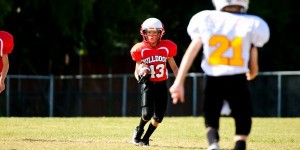 Children do get root canals, and it is generally due to some type of injury to their teeth. When children play contact sports, it is important that they wear a mouthguard, though children can definitely injure their teeth in other ways. Read on to learn more about the importance of mouthguards, and thanks for visiting us at Advanced Endodontics of Lakewood, OH.
Children do get root canals, and it is generally due to some type of injury to their teeth. When children play contact sports, it is important that they wear a mouthguard, though children can definitely injure their teeth in other ways. Read on to learn more about the importance of mouthguards, and thanks for visiting us at Advanced Endodontics of Lakewood, OH.
What do you say when parents come to you asking if their children who play sports should wear a mouthguard? With the release of a recent study showing that high school football players wearing store-bought, over-the-counter mouthguards were more than twice as likely to suffer mild traumatic brain injures/concussions than those wearing custom-made, properly fitted mouthguards, more parents may be asking you about this in the coming weeks.
The American Academy of Pediatric Dentistry surveys confirm that as much as 39% of all dental injuries in children are caused by direct hits with a hard object, such as a puck, ball, or stick in player-to-player contact. And while you would expect that high-contact sports, such as martial arts or rugby, to have a high risk of dental injury, gymnastics and cheerleading also pose a considerable risk.
In its handout, “Protecting Teeth with Mouthguards,” the ADA states that “an athlete is 60 times more likely to suffer harm to the teeth when not wearing a mouthguard” (Journal of the American Dental Association, December 2006, Vol. 137:12, p. 1772).
The function of a mouthguard, also called a gum shield, is to help cushion a blow to the mouth, minimizing the risk of broken teeth and injuries to a child’s lips, tongue, face, or jaw. When it comes to protecting the mouth, a mouthguard is an essential piece of gear that should be a part of standard athletic equipment from an early age, according to the ADA.
With numerous options available on the market, particularly in the home sector custom-fit guards, the choice ultimately boils down to three main factors: protection, comfort, and cost. The ADA has four recommends for choosing mouthguards:
- The mouthguard should be strong and resistant to tears.
- It should fit properly and comfortably stay in the athlete’s mouth.
- The mouthguard should be easy to clean.
- It should allow the athlete to talk, breathe, and stay hydrated during the game.
Which brings us back to the question of what do you tell parents of children playing sports? And then their natural follow-up question is: Which mouthguard is the best?
There are three types of mouthguards: stock, custom fit, and dental.
Continue reading HERE.


